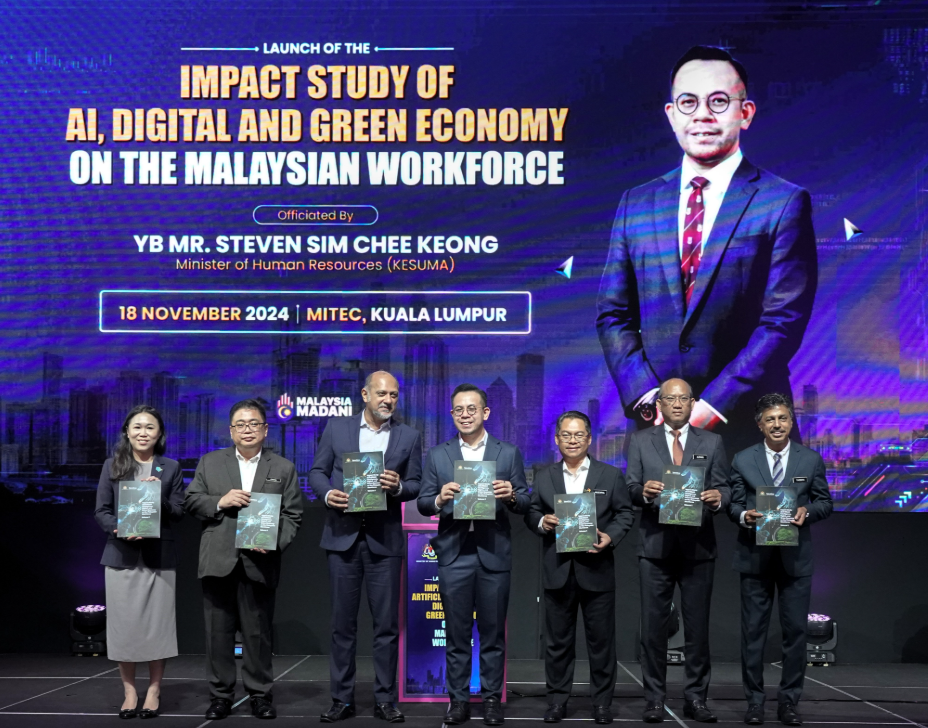620,000 employees in Malaysia will be affected by the influence of AI, digital, and green economy trends, official study shows

Approximately 620,000 employees will be highly impacted over the next three to five years due to the influence of artificial intelligence (AI), digital, and green economy trends, based on a study on the impact of AI, digital technology, and the green economy on the Malaysian workforce.
Talent Corporation Malaysia Berhad (TalentCorp), the strategic think tank for the Ministry of Human Resources (KESUMA) of Malaysia, said in its study on Monday that these employees face potential job displacement and convergence as a result of these evolving technologies and practices.
Due to their large employee populations, the wholesale and retail trade and food manufacturing and services sectors have the highest number of highly impacted employees.
Global business services is notable for its 32 percent rate of highly impacted employees, largely due to the extensive use of automation through AI and Digital for routine or transactional tasks.
On the other hand, the aerospace and energy and power sectors exhibit the lowest percentage of highly impacted employees.
The aerospace workforce has already integrated AI and digital technologies, while in exploration and production (E&P), existing roles are only moderately impacted, likely due to the sector’s stringent regulations.
The study’s key findings also revealed that out of 889 existing roles across ten sectors, approximately 10 percent (84) are classified as highly impacted roles.
Global business services faces the highest number of highly impacted roles at risk, totaling 18.
This is largely due to its repetitive and transactional nature, which makes it more vulnerable to automation and technological advancements.
In contrast, sectors such as information and communication technologies (ICT), aerospace, and electrical and electronics (E&E) exhibit the lowest percentage of highly impacted roles at risk, each with less than 10 percent.
This lower risk is attributed to the specialized skills and expertise required in these fields, which are inherently more human-centric and less susceptible to automation.
AI and digital technologies primarily support human roles rather than replace them.
Additionally, energy and power has no highly impacted roles at risk due to its heavily regulated nature, which necessitates human oversight for safety and compliance, particularly during the energy transition.
This regulatory environment further diminishes the need for automation in core roles.
The study focuses on 10 key sectors — aerospace, chemicals, E&E, energy and power, food manufacturing and service, global business services, ICT, medical devices, pharmaceutical manufacturing, and wholesale and retail trade— collectively contributing MYR 933 billion ($209 billion) (60 percent) to Malaysia’s gross domestic product (GDP) in 2023.
“The study by TalentCorp highlights immense opportunities for Malaysian workers as AI, digitalization, and the green economy transform industries,
“By identifying critical skills and emerging roles, we empower Malaysians to adapt and lead globally, driving sustainable growth and resilience in our workforce,” said Steven Sim Chee Keong, Human Resources Minister of Malaysia.
Central to these efforts is MyMAHIR, a comprehensive digital platform designed to equip Malaysian talent with future-ready skills, according to the study.
By integrating the findings of TalentCorp’s Impact Study, MyMAHIR provides valuable insights into industry trends, emerging job roles, skill requirements, career pathways, and training programs across various sectors.
Acting as a centralized resource with a detailed skills taxonomy, it empowers policymakers, employers, professionals, and students with tools to navigate industry changes and seize new opportunities.
“TalentCorp is working closely with industry stakeholders to ensure the Malaysian workforce remains adaptable,
“Through MyMAHIR and our initiatives including the Critical Occupations List and MyNext, we are addressing immediate and long-term needs, equipping Malaysians with skills critical to our economic and global competitiveness,” said Thomas Mathew, Group Chief Executive Officer of TalentCorp.
The study also identifies 60 emerging roles, such as AI engineers, sustainability specialists, and bio-process engineers, which are pivotal to advancing Malaysia’s green and digital economy.
To support workforce upskilling and reskilling, Sim announced that through KESUMA’s MYR 3 billion ($670 million) fund, the ministry will offer support through levies, credits, scholarships, and matching grants.
Incentives for in-demand courses, such as scholarships for critical skills, are also under consideration.
These will be made available through the MyMAHIR platform, and the upcoming Akademi KESUMA to be introduced next year, to provide comprehensive resources for skill development and career advancement.
Looking ahead, Phase 2 of the study will expand to cover 12 additional sectors in 2025, reinforcing TalentCorp’s commitment to equipping the nation’s workforce with the skills needed to thrive in an evolving economy.
As Malaysia progresses towards a green and digital economy, TalentCorp’s initiatives ensure the workforce is not only employable but capable of driving innovation and global leadership, paving the way for a sustainable future, said the study.
#AI #DigitalTransformation #GreenEconomy #WorkforceDevelopment #Malaysia #Ifvex
- Art
- Causes
- Crafts
- Dance
- Drinks
- Film
- Fitness
- Food
- ဂိမ်းများ
- Gardening
- Health
- အိမ်
- Literature
- Music
- Networking
- တခြား
- Party
- Religion
- Shopping
- Sports
- Theater
- Wellness


